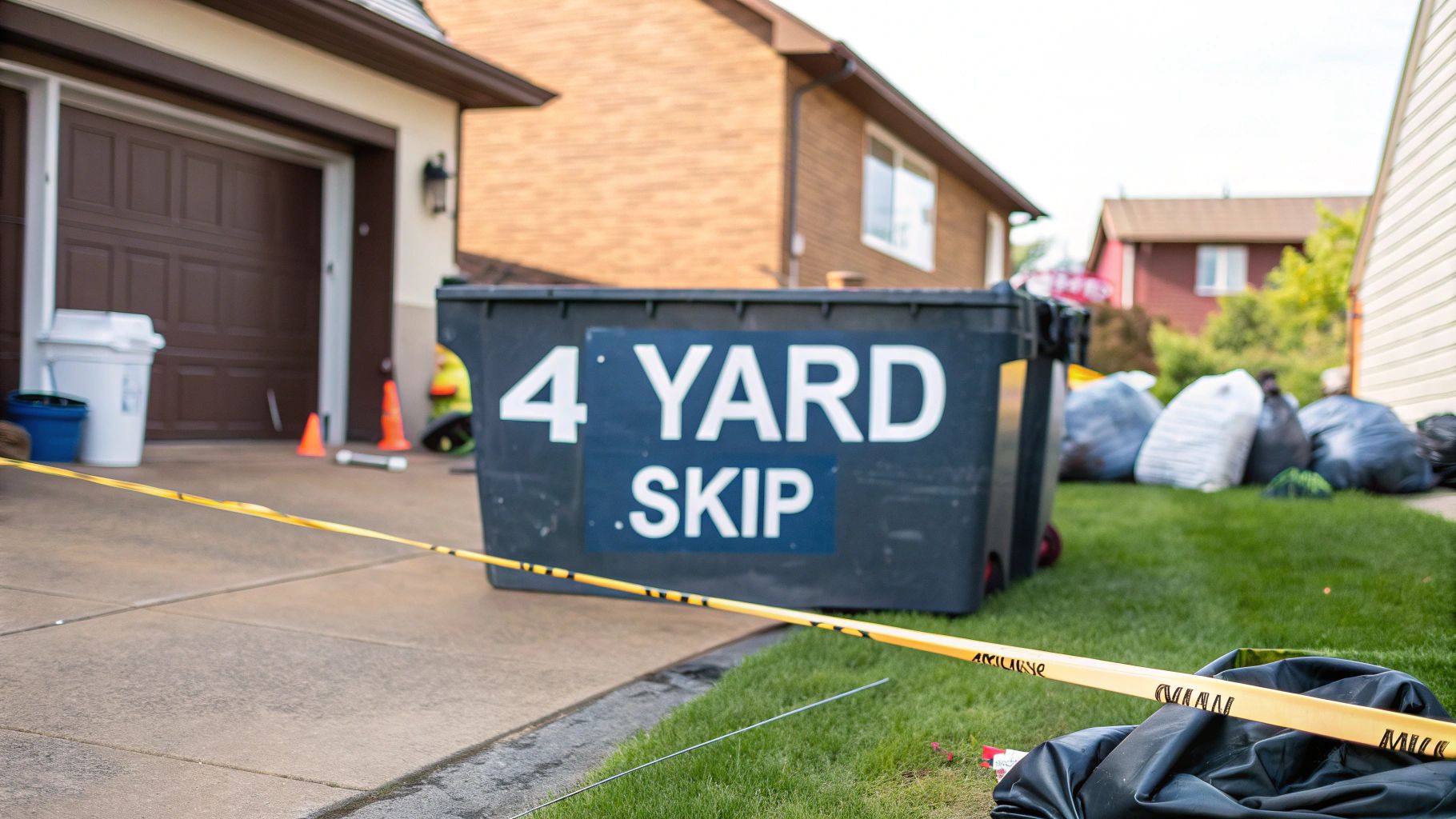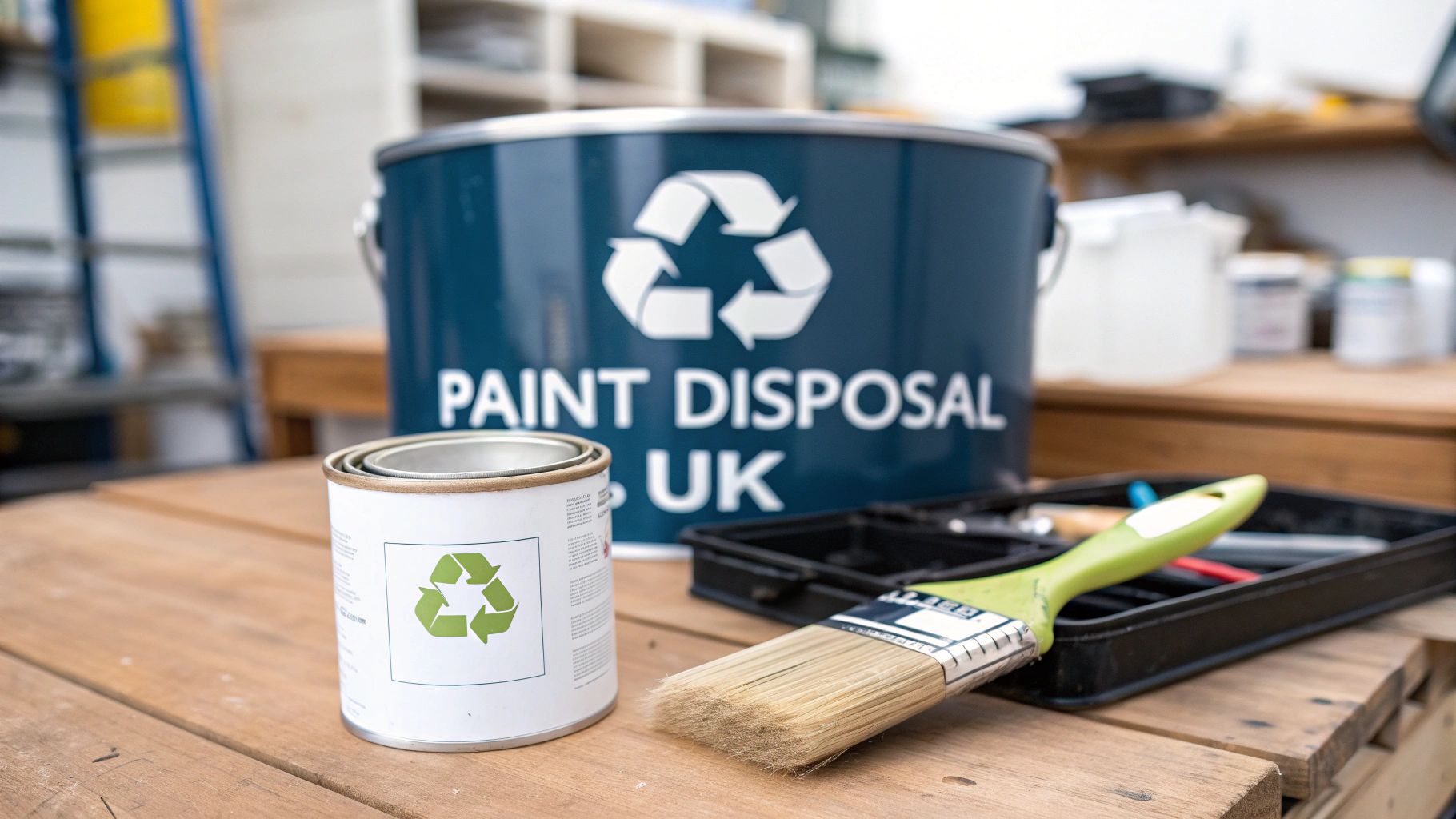Ferndown Skip Hire A Complete Local Guide
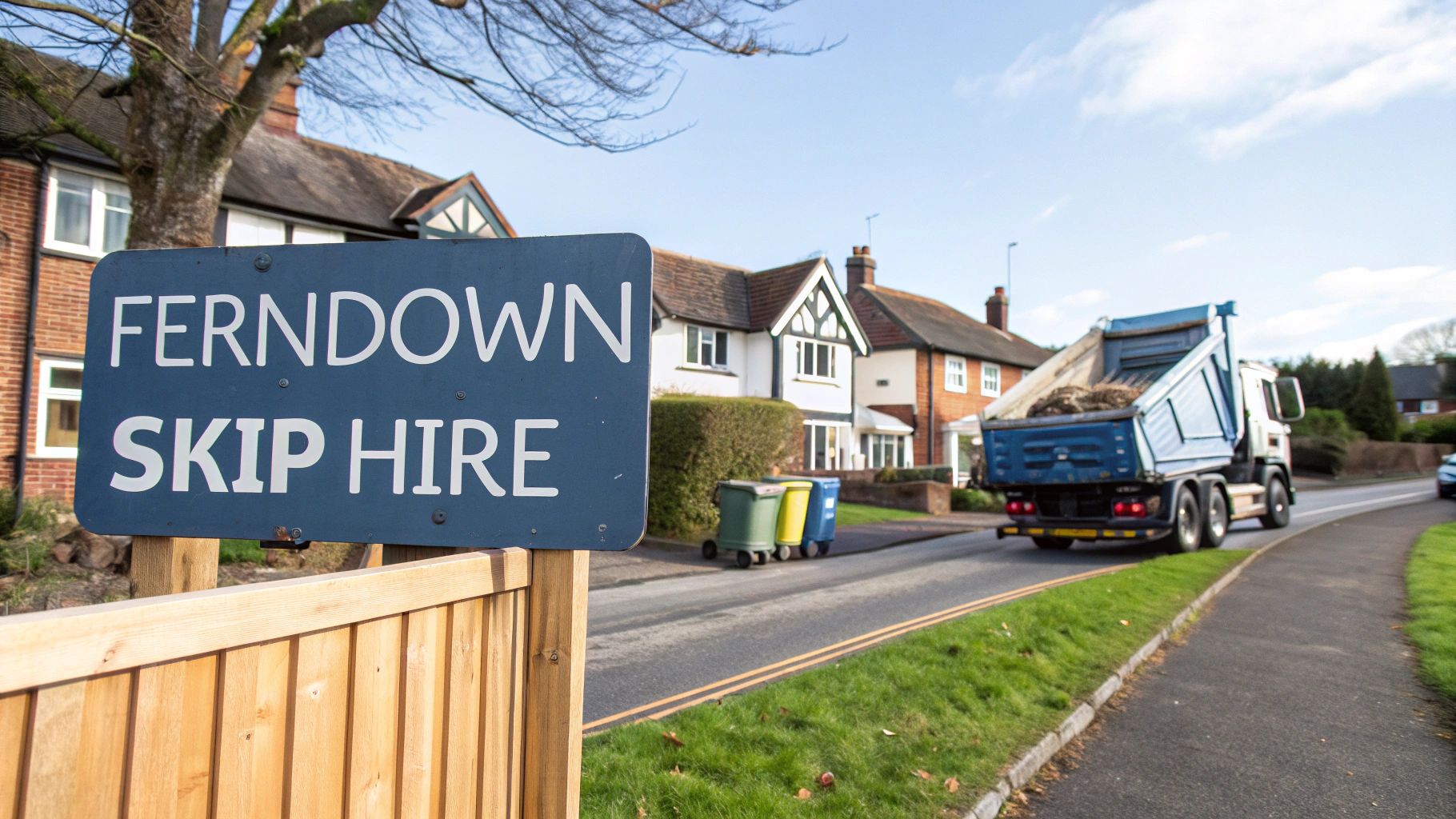
Ferndown Skip Hire A Complete Local Guide
If you're gearing up for a project in Ferndown, whether it's a big garden clear-out or a full-on home renovation, you've probably already realised you're going to have a lot of rubbish to deal with. The most straightforward way to manage it all is usually with a local skip hire. Getting a skip from a local Ferndown company just makes everything simpler, especially when it comes to following Dorset council rules and making sure your waste is disposed of properly.
Planning for Your Project Waste in Ferndown
Any project that involves ripping things out or clearing a space is going to create a mess. Thinking about where all that waste will go before you start is just as crucial as picking out new tiles or deciding on a fence. If you leave it to the last minute, you could end up with a cluttered, unsafe worksite and the stress of trying to sort out a collection in a hurry.
This is where a reliable ferndown skip hire service becomes your best friend. It’s not just about dumping everything in a big metal box; it's about keeping your project running smoothly, safely, and legally. A good local provider will give you practical advice, drop off the skip when they say they will, and give you confidence that your waste is being handled responsibly.
What to Figure Out Before You Book
Before you pick up the phone or book online, spend a few minutes thinking about the specifics of your job. A little bit of prep now will save you a lot of hassle later.
- How much waste are we talking about? A weekend garden tidy-up will produce a lot less waste than a complete kitchen demolition. The scale of your project is the biggest factor in choosing the right skip size.
- What kind of stuff are you throwing out? Is it mostly old furniture and general household junk? Or are you dealing with heavy materials like soil, bricks, and concrete from digging foundations? Some materials have specific disposal requirements.
- Where will the skip actually go? If you have a private driveway with enough space, that's ideal. If it needs to go on the public road or verge, you'll need to sort out a permit from the council first.
- How long will you need it? A standard hire period is usually for 1-2 weeks. If you’re tackling a longer-term renovation, you might need to arrange a more flexible hire.
Nailing down these details first means you’ll get a much more accurate quote and sidestep common problems. Trust me, there’s nothing worse than realising your skip is too small halfway through the job or having to pay for a second one.
Getting your waste management sorted early on keeps your Ferndown project from grinding to a halt. It turns a potential headache into just another ticked box on your to-do list, freeing you up to focus on the actual work.
Choosing the Right Skip Size for Your Project
Getting the skip size right is probably the most important part of the whole process. It’s a decision that hits your wallet and affects how smoothly your project runs. If you get it wrong, you’re looking at annoying delays or spending more than you need to, which can turn a straightforward job into a real headache.
It's a bit like packing for a trip. You wouldn't lug a massive suitcase around for a weekend away, but you also can’t squeeze two weeks of clothes into a tiny carry-on. The same thinking applies here. You need the perfect fit for the amount of waste you’ll be generating.
Matching Skips to Common Ferndown Projects
Let's put aside the abstract measurements for a moment and think about real-world jobs you might be doing around Ferndown. It's much easier to pick the right skip when you can picture the rubbish you need to get rid of.
To make things even clearer, here’s a quick guide to help you match a skip size to your project.
Ferndown Skip Size Guide for Common Projects
| Skip Size (Yards) | Approx. Bin Bags | Ideal For (Ferndown Examples) |
|---|---|---|
| 4-Yard 'Midi' | 30-40 | Perfect for a small bathroom refit, clearing a single bedroom, or a weekend garden tidy-up. |
| 6-Yard 'Small Builders' | 50-60 | The go-to for a full kitchen renovation or a larger garden project involving soil and rubble. |
| 8-Yard 'Builders' | 70-80 | Our most popular size for big jobs like a house extension or major property refurbishment. |
As you can see, matching the skip to the scale of the work is the key to getting it right the first time.
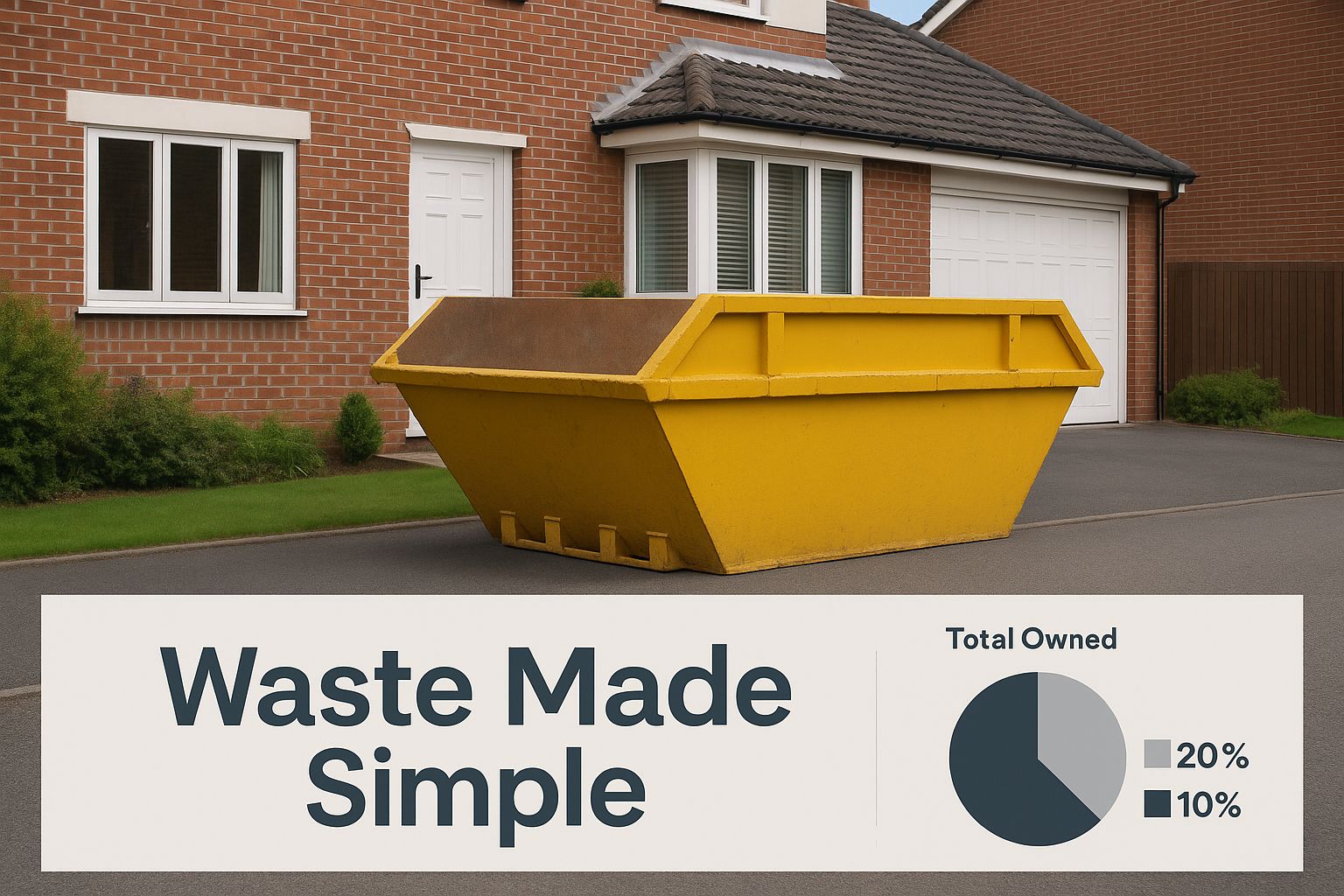
Having a dedicated skip on your drive doesn't just contain the mess; it keeps your work area safe and organised. It makes the whole job feel much more under control.
A Quick Tip from Experience: If you find yourself stuck between two sizes, always go for the bigger one. The extra cost is usually pretty small compared to the expense and hassle of having to order a second skip down the line.
At the end of the day, taking a few minutes to properly think about how much waste you’ll have will make your Ferndown skip hire experience seamless and cost-effective.
If you’d like to dig a bit deeper into the options, our guide on what size skip you might need has even more examples to help you decide.
Sorting Out Dorset Council Skip Permits and Rules
Deciding where your skip will go is just as critical as choosing the right size, especially if it’s not staying on your own property. For any job in Ferndown, if the skip has to be placed on a public road, pavement, or even a grass verge, you are legally required to get a permit from Dorset Council. This isn't just about ticking boxes; it's a vital safety requirement.
Think of a skip permit (sometimes called a skip licence) as official permission from the local council. It confirms that the skip is positioned safely, won't block traffic or pedestrians, and has the right markings to be visible at night. It’s essentially a temporary parking pass for a very large, very heavy container.
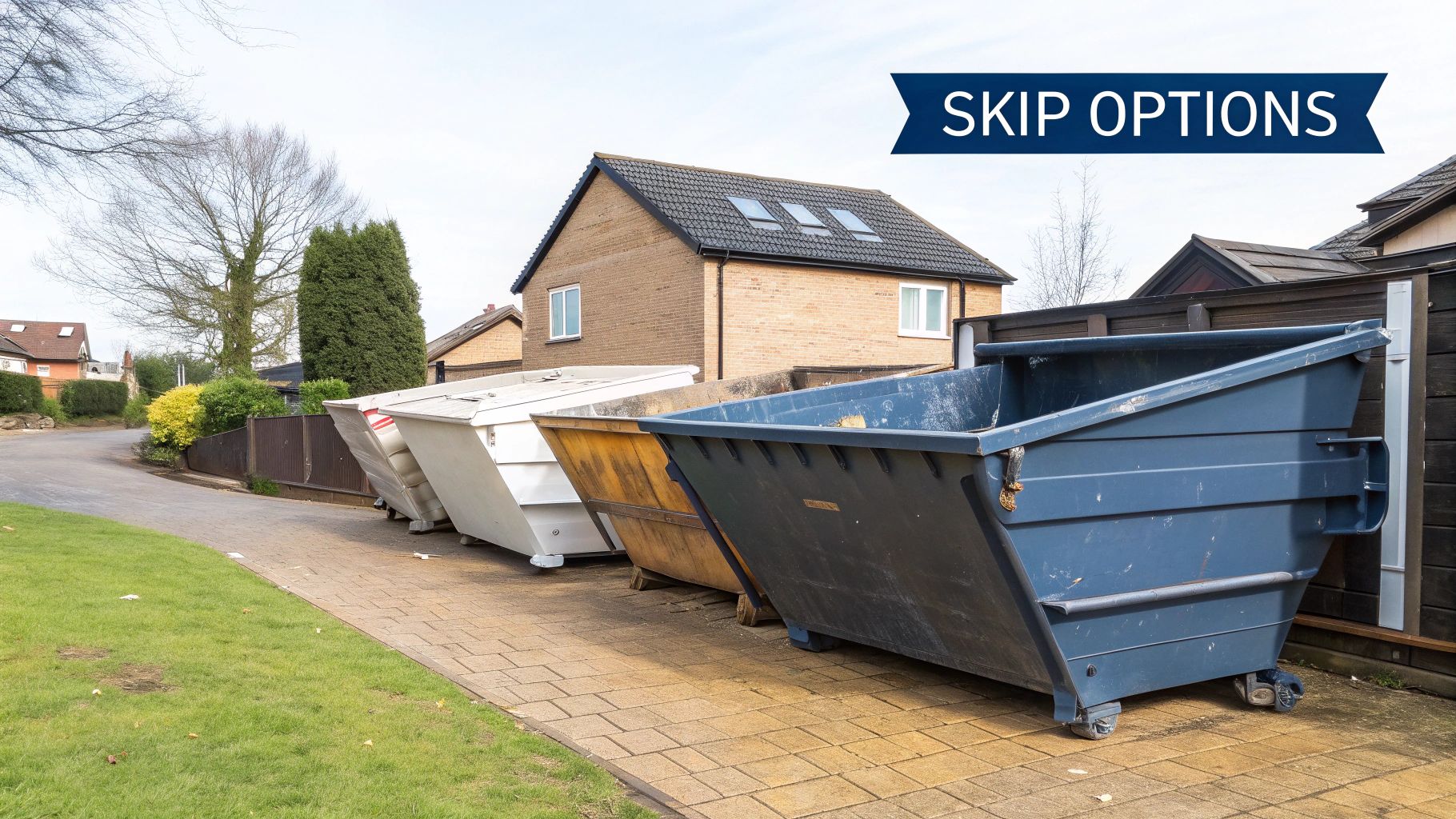
How to Get Your Skip Permit Sorted
Here's the good news: you don't have to navigate the council's paperwork yourself. A reputable Ferndown skip hire company, like us, will handle the entire permit application for you. We’re already registered with Dorset Council and know precisely what they need to get it approved quickly.
We’ll take care of the details, but we'll need a bit of information from you first:
- The exact placement: We need the full address and a clear idea of where the skip will be sited.
- How long you'll need it: Permits are time-sensitive, so we need to know the planned hire duration.
- The permit fee: The council charges for the licence, and this cost will be included in your final quote.
The key here is to plan ahead. Dorset Council generally needs around 3 to 5 working days to process and issue a permit. This means that unfortunately, last-minute requests for skips on a public road just aren't possible.
A Quick Word of Warning: Ultimately, the legal responsibility for having a valid permit rests with you, the person hiring the skip. If a skip is found on public land without one, the council can issue a hefty fine.
When You Can Skip the Permit Altogether
Things get a lot simpler if you have a bit of private space. You do not need a skip permit if the container can sit entirely on your own property. This is the ideal scenario.
This includes places like:
- Your driveway
- A front garden
- Any other private land that isn't part of the public highway
Opting to place the skip on your property is easily the most hassle-free and economical choice. You'll save money on the permit fee and avoid the wait for the council's approval. If you have a driveway, it's always the best spot for your skip.
If placing a skip on your drive or the road isn't an option—perhaps due to a very narrow street or access issues—a 'wait and load' service is a fantastic alternative. With this service, the driver brings the skip but stays while you load it (typically for about 30 minutes), then takes it away immediately. Because the skip never touches the ground or leaves the vehicle, no permit is required.
Understanding the Real Cost of Skip Hire
When you're budgeting for a project, the price you see for Ferndown skip hire isn't just for a big metal box. The final quote is a blend of several factors, many of which come down to environmental responsibilities and the simple logistics of the job. Getting your head around these elements helps you see the real value behind the price tag and compare different quotes properly.
The journey your waste takes doesn't stop when our lorry pulls away from your drive. A huge chunk of the hire cost covers what happens next: the sorting, recycling, and responsible disposal of everything inside. This is a complex process, heavily guided by government rules aimed at sending as little as possible to landfill.
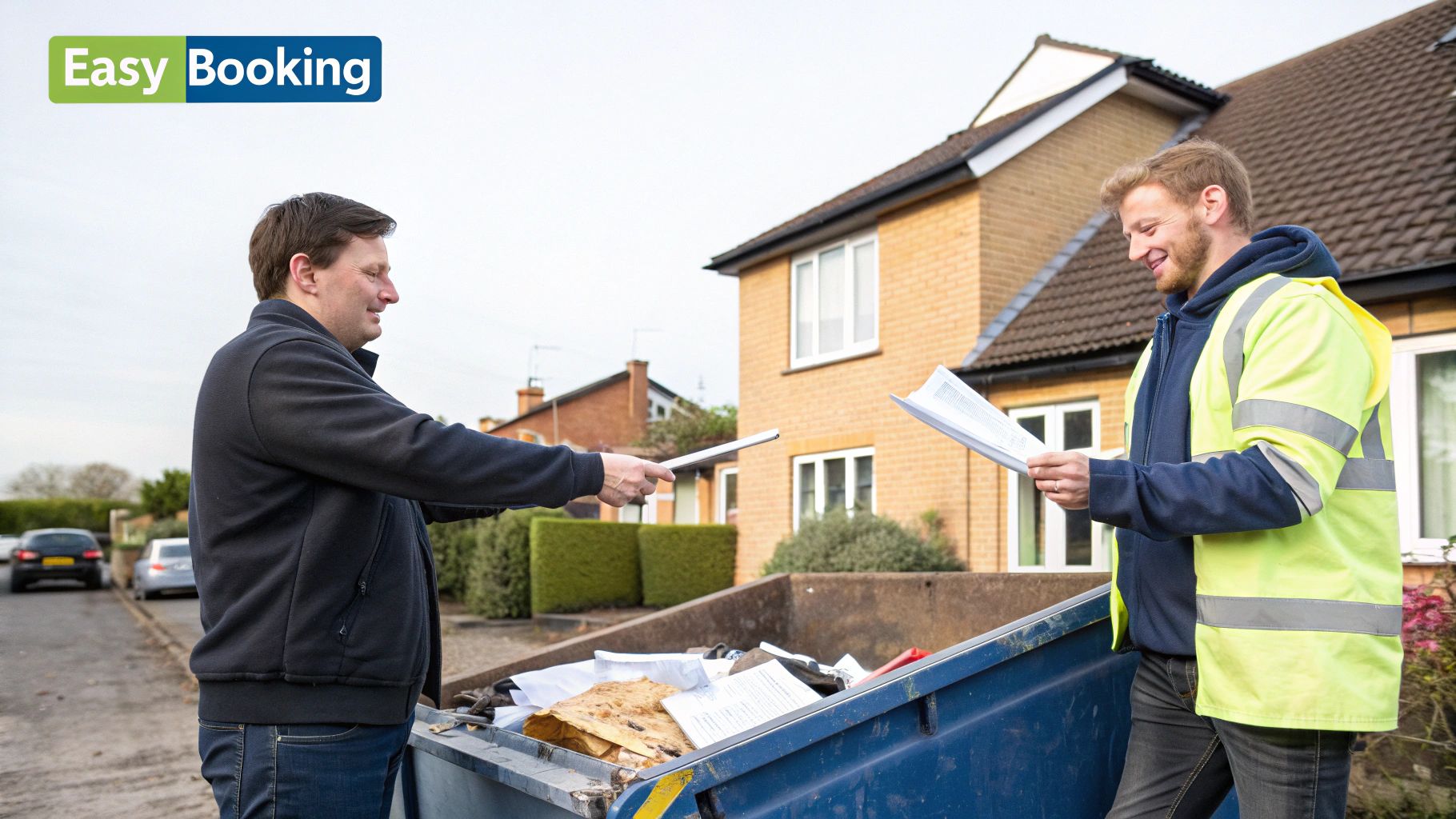
Key Factors That Shape Your Quote
A few key variables come together to determine the price you'll pay for your skip. If you know what they are, you can anticipate the costs much more accurately.
- What's going in it? A skip full of clean, inert waste like soil and rubble is generally cheaper to process than one with mixed general waste, which takes a lot more manpower to sort through.
- How long do you need it? Your standard quote will usually cover a set hire period. If you think you'll need the skip on-site for longer, be aware that extra charges might apply.
- Permit fees: Like we mentioned earlier, if the skip has to live on a public road in Ferndown, the Dorset Council permit fee gets added to your total.
These are the core pieces of the puzzle, but wider economic pressures play a big part too.
The Impact of Landfill Tax
One of the biggest outside influences on skip hire prices is the UK Landfill Tax. This is a government levy designed to make burying waste more expensive, giving everyone a massive incentive to recycle more.
This tax has a direct and significant impact on our operating costs. To give you an idea, the standard landfill tax rate is set to climb to £126.15 per tonne in April 2025. Back in 2019, it was just £91.35 per tonne. That's a 38% hike that we, and every other waste company, have to factor in.
Think of the Landfill Tax as a shared investment in a greener future. The price you pay helps fund a more sustainable way of dealing with our rubbish, steering it away from landfill sites and towards recycling facilities instead.
Watching Out for Extra Charges
Finally, it's really important to know that some items just can't be thrown in with general waste. They require special handling and disposal, so putting them in your skip will almost certainly lead to extra charges.
Be on the lookout for these common culprits:
- Mattresses
- Plasterboard
- Fridges and freezers
- Tyres
- Televisions and monitors
If you have any of these to get rid of, just have a word with us first. Being upfront about what you're disposing of means we can give you a completely accurate quote with no nasty surprises down the line. For a more detailed look at local rates, have a read of our guide to skip hire prices in Dorset.
Getting the Most Out of Your Skip: Loading and Space-Saving Tips
Once that bright yellow skip lands on your drive, the temptation is to just start chucking everything in and get the job over with. I get it. But a little bit of strategy at this stage goes a long, long way. By loading your skip smartly, you can genuinely fit so much more in, making sure you’re getting the best possible value from your Ferndown skip hire.
Think big first. Any large, bulky items like old wardrobes, dismantled sheds, or clunky bits of furniture need to be your priority. Break them down as much as you can before they even go near the skip. A flat-packed wardrobe, for instance, takes up a tiny fraction of the space it would otherwise, freeing up huge amounts of room for everything else.
Building a Strong Foundation
The secret to a well-packed skip is starting from the bottom up. Lay any flat items down first to create a solid, level base. It’s a bit like a game of Tetris, really. Old doors, sheets of plasterboard, or broken fence panels are perfect for this.
With your base in place, it’s time for the heavy stuff – soil, rubble, bricks, that sort of thing. Spread these materials evenly across the bottom. This uses the volume efficiently and, just as importantly, keeps the skip stable. Once the heavy waste is in, you can start fitting the lighter, more awkward-shaped items on top, tucking them into any gaps you can find.
A well-loaded skip isn't just a matter of being efficient; it’s a crucial safety issue. An unbalanced or overloaded skip is a genuine hazard, which is why there are such strict rules about how they can be filled and transported.
The All-Important Level Load
You’ll hear the term ‘level load’ from any reputable skip company, and it’s one rule we can’t bend. It simply means that all of your waste must sit within the sides of the skip. Nothing can be sticking out or piled up above the top edge.
It’s actually illegal to transport an overfilled skip on the road. Our drivers are not legally allowed to collect it if it's piled high, as there's a real risk of items falling out and causing a serious accident. If we arrive and find the skip is overloaded, we'll have to ask you to remove the excess waste before we can take it away.
What You Absolutely Cannot Put in a Skip
Knowing how to fill a skip is one thing, but knowing what to leave out is just as critical. Certain materials are classed as hazardous and are strictly forbidden from general waste skips due to safety and environmental laws.
Be sure to keep these items out of your skip:
- Asbestos: This is a hazardous material that needs specialist disposal.
- Fridges and Freezers: They contain coolant gases that must be handled by professionals.
- Tyres: These are notoriously difficult to dispose of and follow a separate recycling path.
- Gas Canisters: Any pressurised container is a potential explosion risk and is a definite no.
- Paint Tins and Solvents: These are considered hazardous chemical waste.
If any of these items are found in your skip, we may have to return it to you or apply significant extra charges to cover the cost of safe disposal. If you’re ever in doubt about an item, just give us a call and ask. For a more in-depth look, check out our guide on how to fill a skip for maximum efficiency to avoid any of the common pitfalls.
The Benefits of Using a Local Skip Hire Company
When you start looking into Ferndown skip hire, you’ll quickly find you have two main options: the big national brokers or a genuinely local company. It can be tempting to go with a familiar national name, but trust me, the advantages of sticking with a provider based right here in Dorset are huge. It can make the entire process, from delivery to collection, run so much smoother.
A local team offers more than just a metal box; they bring invaluable on-the-ground knowledge that a faceless broker miles away simply can't compete with.
Better Service and Greater Flexibility
Think about it. A local driver knows Ferndown inside and out—from the main drags to those tight residential cul-de-sacs. This firsthand experience is a massive plus. They can spot potential access issues before they become a problem, advise on the best spot to drop the skip, and make sure delivery and collection happen without a hitch.
When you deal with a local business, you’re talking directly to the people managing your order. No call centres, no middlemen. This makes a world of difference.
- Direct Accountability: You're speaking to someone who actually knows the area and can make a decision on the spot.
- Adaptable Scheduling: Plans change. If you finish your clear-out a day early and need the skip gone, it's far easier to arrange with a local team that manages its own fleet.
- Real-World Advice: A local expert can give you practical advice based on countless similar jobs they've handled right here in Ferndown.
This hands-on approach builds a level of trust and confidence that is hard to find elsewhere. You know your waste is being handled by a team that genuinely cares about its local reputation.
Choosing a local skip hire company in Ferndown means you’re not just another order number in a national system. You’re a valued customer, and the service you receive reflects that personal commitment.
Investing in the Local Dorset Economy
On top of the practical benefits, choosing a local company means you're putting your money back into the Dorset economy. It helps sustain local jobs and supports other businesses in our community.
Local providers are also deeply invested in the area's environmental health. They usually have strong ties with local recycling facilities, working hard to ensure as much of your waste as possible is diverted from landfill.
The UK skip hire market is a competitive one. While the market has seen an average growth of 2.6%, recent analysis showed that 298 out of 922 companies actually saw their sales drop. It's a tough environment. You can see more on this in the Plimsoll skip hire market report.
By choosing a reputable local provider, you're not only getting better service but also supporting a business that's committed to navigating this challenging market while maintaining high standards. That kind of reliability is exactly what you need for a stress-free project.
Your Ferndown Skip Hire Questions Answered
When you're looking to hire a skip in Ferndown, a few questions always crop up. Getting the right answers from the get-go is key to keeping your project running smoothly. I've been in this business a long time, and I've heard them all, so let’s walk through the most common queries.
First off, everyone wants to know about timing. A good rule of thumb is to book your skip at least 2-3 days in advance. This is especially true during the spring and summer rush when everyone's tackling garden projects and clear-outs.
That little bit of notice gives us plenty of time to get your delivery scheduled without any headaches. But, if you're planning to place the skip on a public road, you'll need to think a bit further ahead.
Permits, Placement, and Practicalities
If your skip needs to go on the road, it’s not just our schedule you have to consider; it’s the council’s. A skip permit from Dorset Council can take a few days to process. To be on the safe side, I always tell people to book at least five working days in advance. This buffer saves a world of stress and ensures you’re not left waiting for paperwork to clear.
Another big one is overfilling. What happens if you pile it too high? Simply put, you can't. Every skip has a 'level load' line, and filling it past that point is a major safety risk. Our drivers are legally not allowed to transport an overloaded skip—imagine bricks or debris falling onto the road. It's a risk we can't take.
If we arrive for collection and find the skip is overfilled, you'll need to remove the excess waste before we can legally and safely transport it. This can cause delays and might even lead to extra charges, which nobody wants.
Mixing Your Waste
Finally, people often ask if they can mix heavy stuff like soil and rubble in with their general household waste. The answer is yes, you absolutely can. For a standard mixed waste skip, that's completely fine.
However, here’s a pro tip: if you have a massive amount of only soil, bricks, or concrete, give us a call first. We can often arrange a dedicated skip for this ‘inert’ waste at a better price. Why? Because it’s so much easier for us to recycle, and we pass those savings on to you. It's a smart way to make your project a bit more budget-friendly.
Ready to get started or just need some friendly advice? Get in touch with us at The Waste Group. We’re here to make your Ferndown skip hire experience as simple as it should be. You can find out more over at https://www.thewastegroup.co.uk.
